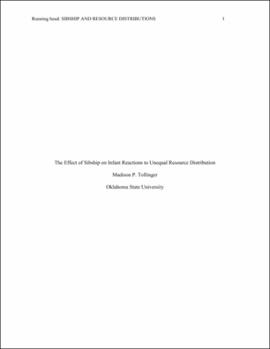| dc.contributor.author | Tollinger, Madison P. | |
| dc.date.accessioned | 2021-05-25T20:03:29Z | |
| dc.date.available | 2021-05-25T20:03:29Z | |
| dc.date.issued | 2021-05-10 | |
| dc.identifier | oksd_tollinger_HT_2021 | |
| dc.identifier.uri | https://hdl.handle.net/11244/329896 | |
| dc.description.abstract | The ability to behave prosocially is something that develops throughout the course of infancy and childhood just as many other cognitive traits do (Dunn & Munn, 1968). Eventually one will develop enough cognitively to be capable of the various instances of social interactions and evaluations that aid in the development of this behavior. Despite these prosocial traits not being fully developed until an older age it has been found that infants possess the ability to evaluate situations of resource distribution as either prosocial or antisocial as young as 18-months-old (Geraci & Surian, 2011). Research regarding sibling interactions suggests that sibship aids in the ability to behave prosocially (Dunn & Munn, 1986; Fehr et al., 2008; Lamb, 1978). Previous work regarding the response of infants to unequal resource distribution does not often account for the effect that an infant's sibship status has or would have on their ability to react to unequal resource distribution. Studies aimed at assessing sibling interactions in relation to prosocial behavior and development do not often go as far as creating trials to test such behaviors under distributive circumstances. The purpose of this study is to extend upon previous research done by Jordan (2018) to determine how sibship effects an infant's reaction to receivers of unequal resource distribution. Specifically, this study assesses infants reactions to trials involving both animate and inanimate receiving agents of unequal resource distribution and observing the infants looking behaviors to determine preference between the resource rich or the poor receivers. | |
| dc.format | application/pdf | |
| dc.language | en_US | |
| dc.rights | Copyright is held by the author who has granted the Oklahoma State University Library the non-exclusive right to share this material in its institutional repository. Contact Digital Library Services at lib-dls@okstate.edu or 405-744-9161 for the permission policy on the use, reproduction or distribution of this material. | |
| dc.title | Effect of sibship on infant reactions to unequal resource distribution | |
| osu.filename | oksd_tollinger_HT_2021.pdf | |
| osu.accesstype | Open Access | |
| dc.type.genre | Honors Thesis | |
| dc.type.material | Text | |
| dc.contributor.director | Jordan, Evan | |
| dc.contributor.facultyreader | Mullins, Larry | |
| thesis.degree.discipline | Psychology | |
| thesis.degree.grantor | Oklahoma State University | |
